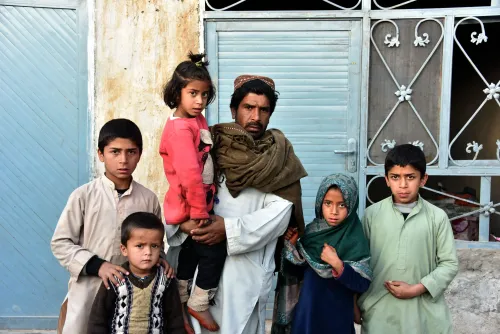Afghan Authorities Detain Over 34,000 Beggars to Combat Begging Culture

Synopsis
Key Takeaways
- Over 34,000 beggars arrested in Afghanistan.
- Majority identified as fraudulent or professional.
- Commission established to categorize beggars.
- Financial assistance planned for genuinely needy individuals.
- Over 23 million Afghans face a food crisis.
Kabul, Feb 9 (NationPress) The Afghan police have detained over 34,000 beggars nationwide in the past year as part of efforts to eradicate the culture of begging, according to a deputy from the counter-narcotics division of the Ministry of Interior Affairs.
"A total of 34,377 beggars have been apprehended over the last year," Mullah Abdul Haq Akhund Hamkar reported to the National Radio and Television of Afghanistan (RTA) on Sunday.
The majority of those arrested were found to be fraudulent or professional beggars, as noted by the official. Following investigations, the police have arranged a monthly stipend for those genuinely in need and have referred professional beggars to relevant authorities for further scrutiny, as reported by Xinhua news agency.
A dedicated commission has been formed to document beggars and classify them as "professional", "destitute", or "organised", which includes collecting their biometric data and fingerprints.
According to Taliban representatives, approximately 60,000 beggars have been "rounded up" in Kabul alone.
The new anti-begging legislation stipulates that if a beggar dies while in custody and lacks family, municipal officials will oversee the burial, as outlined in Article 25.
Individuals classified as "destitute" are entitled to financial aid post-release, although no women have reported receiving such assistance.
Officials in Balkh have initiated a campaign to apprehend beggars in Mazar-e-Sharif city and surrounding areas.
According to the officials, the beggars will receive 2,000 Afs monthly after the process concludes.
"If they are genuinely poor and vulnerable, we will provide them with 2,000 Afs each month," stated Noor-ul-Huda Abu Idris, the deputy governor of Balkh.
"While some beggars may be fake, others are truly in need. Future efforts will help distinguish between the two, as this commission has been established for this purpose," added Faizullah Faizi, head of the commission.
The Afghan caretaker government is determined to combat the culture of begging as part of its initiative to maintain a clean society.
Reports indicate that more than 23 million Afghans, nearly half of the country's population, are facing a severe food crisis.








